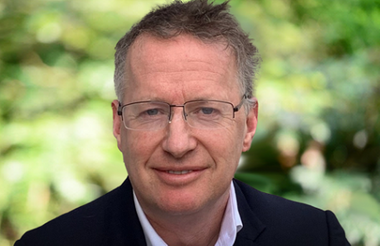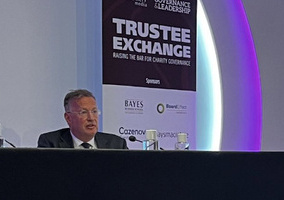The Charity Commission will “not dance to the tune of media outlets” when it comes to retaining independence, its chair has said.
Orlando Fraser was speaking at an Association of Chairs event, where he discussed the role of charity chairs and the Commission’s vision and plans.
Fraser reiterated his commitment to lead “an expert regulator” that is “fair, balanced and independent”.
“Independence means above all that we will make our decisions free from the directions of others, free from party politicians from government, interest groups, the media and from the sector itself,” he said.
“Helen [Stephenson], our chief executive, and I are answerable to parliament for the way in which we lead the organisation and deliver on our functions. But we’re beholden to the law in our regulatory engagements. We will listen to a wide range of voices. I’ve met, for example, with many politicians from both sides of the house to explain our work and to hear their perspectives, including ministers and their shadows, but they do not direct us in our work, nor should they”.
‘Transparent engagement’ with the public
Fraser said that he also strives to have “transparent engagement with the public we serve via the media”.
However, he said “our independence means that the Commission will not dance to the tune of any media outlets and the way that we regulate”.
“I will gladly champion the sector we are all committed to and take messages to audiences that have historically proved more suspicious of our work,” he said.
“We also need to remain independent of charities. Rest assured the Commission will remain independent in the interest of individual charities in the sector and indeed the organisations we represent and advocate for.”
Upcoming guidance
Fraser said that the Commission is currently developing its new five-year strategy and that it will publish its investment guidance “before the summer break”.
On the investment guidance, he said: “I appreciate this has drawn considerable scrutiny and comment, especially from charities who are particularly interested in our work in this area. This is an important milestone following last year’s tribunal hearing and I hope the publication will give trustees like yourselves the competence to make the right decisions about investments of all kinds.”
He added that he is keen to find the “right balance” on the use of social-media platforms, saying that “as with all our guidance”, upcoming guidance will not place “undue expectations” on the trustees conducting their duties.
“We hope to release the final guidance a little later this year,” he said.
Modelling ‘a better kind of public discourse’
Fraser previously called on the charity sector to “model a better kind of public discourse” on migrants and refugees and said charities that engage in political campaigning must do so in a “responsible and measured fashion”.
During the Q&A, a charity chair asked him if he could clarify what “campaigning with kindness” means.
Fraser replied: “Where we’re trying to get away from is this negativity, aggression and hate you sometimes see in party politics, moving towards a better kind of discourse that you heard Joe Biden talk about in America and Michelle Obama […] and we’re aiming towards a form of discourse that doesn’t involve anger and hate in campaigning.”
He added: “In principle, charities should not have a difficulty of being kind, that should be at the core, kindness, compassion and love. That shouldn’t be that difficult and I think it’s reasonably obvious the sort of direction of travel on that particular point.”
Cost-of-living crisis remains ‘biggest issue’ for regulator
Asked what is “keeping the Commission awake at night”, Fraser said the “biggest issue remains the cost-of-living crisis”.
“What worries me is that there is damage being done to society and our beneficiaries,” he said.
“I’m fully behind charities going insofar as they can into reserves to try and address this period because if you don’t, you get irreparable damage to your community when it could have been addressed because it’s not something that’s going to go on for five or 10 years, it’s a specific period that we can do something about.”
Related articles











